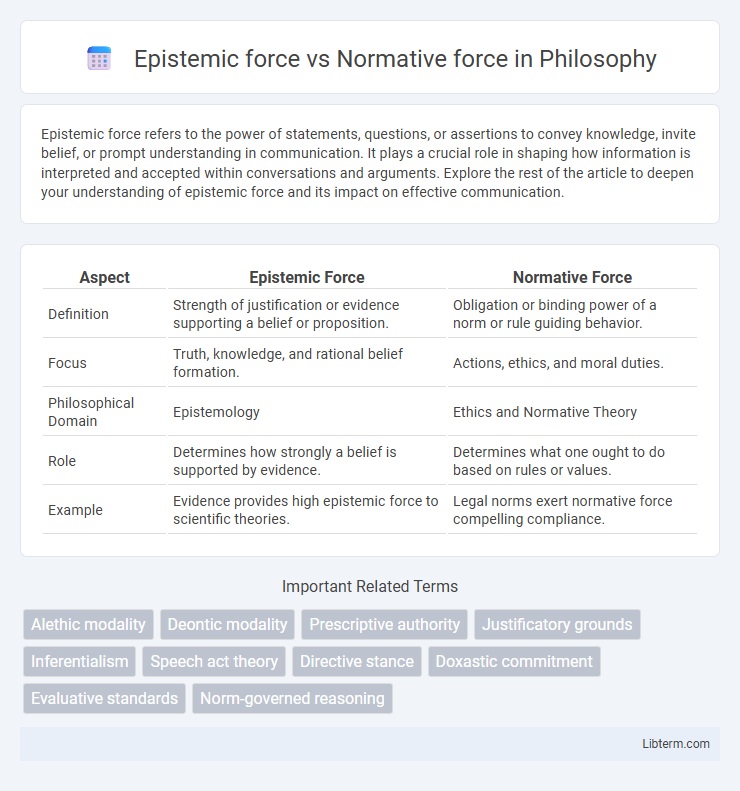Epistemic force refers to the power of statements, questions, or assertions to convey knowledge, invite belief, or prompt understanding in communication. It plays a crucial role in shaping how information is interpreted and accepted within conversations and arguments. Explore the rest of the article to deepen your understanding of epistemic force and its impact on effective communication.
Table of Comparison
| Aspect | Epistemic Force | Normative Force |
|---|---|---|
| Definition | Strength of justification or evidence supporting a belief or proposition. | Obligation or binding power of a norm or rule guiding behavior. |
| Focus | Truth, knowledge, and rational belief formation. | Actions, ethics, and moral duties. |
| Philosophical Domain | Epistemology | Ethics and Normative Theory |
| Role | Determines how strongly a belief is supported by evidence. | Determines what one ought to do based on rules or values. |
| Example | Evidence provides high epistemic force to scientific theories. | Legal norms exert normative force compelling compliance. |
Understanding Epistemic Force: Definition and Scope
Epistemic force refers to the compelling nature of a proposition based on evidence or reason, driving belief formation and judgment. It embodies the strength with which information or arguments justify acceptance or rejection of claims within a cognitive framework. Understanding epistemic force involves analyzing how knowledge, justification, and inference influence decision-making and truth assessment in epistemology.
Defining Normative Force in Philosophical Context
Normative force in the philosophical context refers to the compelling power of ethical principles, rules, or norms that prescribe how individuals ought to act, guiding behavior beyond mere factual beliefs. It embodies the authority exerted by moral standards that generate obligations, duties, or reasons for action, distinguishing normative statements from descriptive ones. This force shapes moral reasoning and justification, anchoring the foundation of ethics and law in prescriptive norms that demand compliance.
Key Differences Between Epistemic and Normative Force
Epistemic force refers to the persuasive power of evidence or reasoning that aims to establish truth or knowledge, while normative force involves the influence of rules, norms, or obligations that guide behavior and decision-making. Epistemic force is grounded in rational justification and factual correctness, whereas normative force is rooted in moral, social, or legal standards that prescribe what ought to be done. The key difference lies in epistemic force seeking to inform belief based on truth, and normative force seeking to regulate action based on what is deemed appropriate or required.
Historical Roots: How Epistemic and Normative Forces Emerged
Epistemic force emerged from classical philosophy, rooted in the pursuit of knowledge and truth, with figures like Plato and Aristotle emphasizing reason and evidence as foundations for belief formation. Normative force developed through ethical and legal traditions, such as Kantian deontology and social contract theories, establishing principles and rules that guide acceptable behavior. Historical interplay between these forces shaped disciplines like epistemology and ethics, highlighting how truth-seeking and moral obligations influence human reasoning and decision-making frameworks.
The Role of Epistemic Force in Justification and Belief
Epistemic force plays a crucial role in justifying beliefs by providing the cognitive support necessary for considering a proposition as true or credible, thereby influencing the strength and reliability of one's belief system. It underpins the justificatory process through evidence assessment, rational insight, and reflective equilibrium, distinguishing justified beliefs from mere opinions or guesses. Normative force, while concerned with the obligations and rules governing belief formation and acceptance, relies fundamentally on the epistemic force to ground these norms in epistemic justification and rational accountability.
Normative Force and the Foundations of Obligation
Normative force refers to the compelling power of norms and obligations that guide behavior through moral or legal prescriptions, establishing what one ought to do. The foundations of obligation rest on principles such as social contracts, moral duties, or legal frameworks that impose binding requirements on agents. Unlike epistemic force, which concerns belief formation and justification, normative force structures action and decision-making within ethical and institutional contexts.
Intersections and Overlaps: When Epistemic Meets Normative
Epistemic force, rooted in knowledge and belief formation, intersects with normative force when evaluative judgments influence what individuals ought to believe or do. This overlap emerges prominently in ethical epistemology, where the justification for beliefs carries normative weight, guiding rational action and moral responsibility. The convergence of these forces underscores how evidential support and moral imperatives jointly shape decision-making processes.
Case Studies: Manifestations in Ethics and Epistemology
Epistemic force refers to the power of evidence and reasons to justify beliefs, while normative force involves the moral or social obligations to act according to certain principles. Case studies in ethics reveal how normative force guides actions through duty or virtue ethics, whereas epistemology exemplifies epistemic force in belief revision and justification processes. For instance, the trolley problem highlights normative force in moral decision-making, whereas the debate over scientific paradigms showcases epistemic force influencing theory acceptance and knowledge claims.
Contemporary Debates on Epistemic vs Normative Authority
Contemporary debates on epistemic versus normative authority focus on how knowledge claims (epistemic force) justify beliefs, contrasting with normative force's role in guiding actions and obligations. Scholars analyze whether epistemic authority inherently entails normative prescriptions or if the two types of authority operate independently within social and philosophical frameworks. This discourse challenges traditional views by exploring how epistemic judgments influence normative expectations in ethical, legal, and political contexts.
Implications for Reasoning, Action, and Decision-Making
Epistemic force influences reasoning by motivating belief revision based on evidence and truth-seeking, facilitating accurate understanding and knowledge acquisition. Normative force shapes action and decision-making by imposing obligations or rules that guide behavior toward moral or social norms, ensuring compliance and accountability. The interplay between epistemic and normative forces determines how individuals balance evidence-based reasoning with value-driven choices in complex decision contexts.
Epistemic force Infographic

 libterm.com
libterm.com